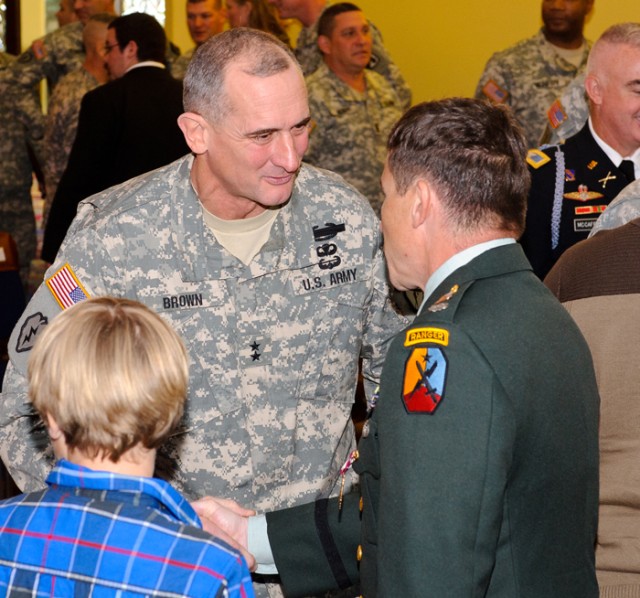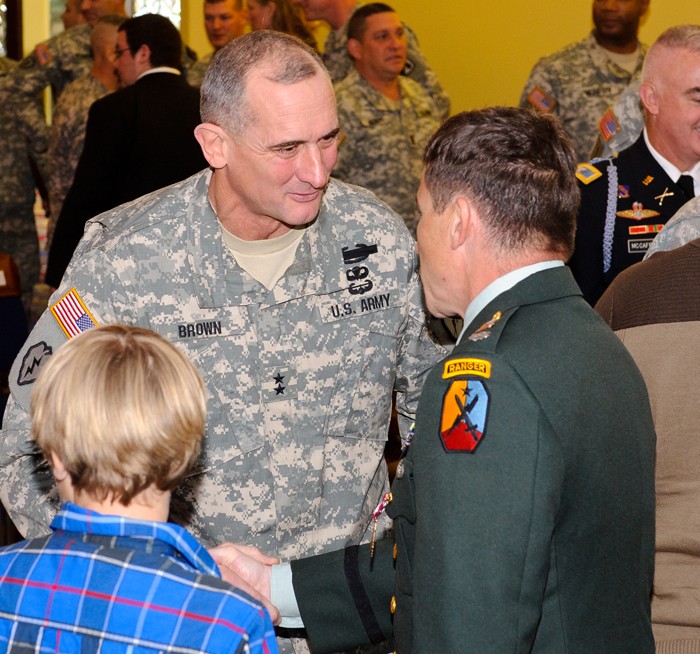FORT BENNING, Ga. - As transformation to the Maneuver Center of Excellence unfolds with the spectacle surrounding the historic Armor-Infantry consolidation, leaders shouldn't lose sight of the post's primary mission, Maj. Gen. Robert Brown said.
"We're still an Army at war, and that's got to be our top priority - preparing the Soldiers and leaders for combat," the MCoE and Fort Benning commanding general said. "No one trains more of those leaders and Soldiers than Fort Benning."
And the numbers are projected to climb as the burgeoning command comes into full view by mid-September to satisfy Base Realignment and Closure requirements. Under the reorganization, every Infantry and Armor second lieutenant, captain and NCO will train at Fort Benning - along with 52 percent of all civilians coming into the Army.
Up to a third of lieutenants emerging from the Basic Officer Leadership Course could immediately join a unit in Afghanistan or Iraq, Brown said.
"So we better do the right things here and train the right way," he said. "The second thing that's incredibly important is preparing for the future. ... As we come out of Iraq and eventually come out of Afghanistan and units have greater dwell time, they need to start thinking about the future. We need to have good debates and discussions.
"No one has a crystal ball, but we do know certain things. This is going to be an enemy that relies on, attacks and goes after our weaknesses. ... We can't ignore the future or we're going to win today and lose tomorrow."
In an hourlong interview Jan. 6 from his office at Ridgway Hall, Brown also discussed his priorities, philosophy, leadership style, and personal thoughts about Fort Benning and the tricommunity.
Comprehensive Soldier Fitness
The general is a big advocate of Comprehensive Soldier Fitness and said it will yield long-term dividends. The $50 million Army effort is aimed at building individual resilience through five pillars of strength: physical, emotional, social, spiritual and family.
"It's a fantastic program," he said. "It came about because of the ops tempo our Army's been at over the last eight to 10 years, but it's also about a generational change. ... Comprehensive Soldier Fitness is really going to make a huge difference in the lives of Soldiers, family members and our Department of the Army civilians if we do it right."
Tying in lessons learned and employing NCOs are critical to making it work, he said.
At Fort Benning, for example, a community health promotion council meets periodically to map out the best use of limited resources. CSF falls under the board, and feedback comes from both the top and bottom through a unit's master resilience trainer.
Brown said the post also is taking the lead on an Army attempt to craft individual resiliency goals books. The voluntary tool would show Soldiers, civilians and family members how to set and reach personal objectives within CSF.
"It's really all about how we can help Soldiers go from good to great, average to above-average and accomplish their goals," he said. "Nobody came into the Army to fail ... so we want to help them get there and help them get better. And we can help our families grow stronger and more resilient."
Adaptive, agile leadership
Brown said the Army has excelled at developing "incredibly agile and adaptive leaders" in the current fight.
"An agile leader is someone who has the ability to solve a complex problem in a timely manner with a creative solution ... because we're facing an enemy that requires that," he said. "And I think we do pretty darn well overall as an Army in adaptability. We adapt to change sometimes faster than other times. But in order to adapt faster, we have to be more proactive and less reactive."
Brown, who's been a brigade commander in Iraq and also served there in 2009 as deputy commanding general of the 25th Infantry Division, said the operational Army typically adapts better than the institutional version. The branch's training concept is stronger than a decade ago, he said, but even more can be done to incorporate simulation, virtual gaming and interactive learning for younger Soldiers.
"Clearly, the thing that's stifling the younger folks are the older folks," he said. "Sometimes, we have to get out of the way and let them develop this technology, use it and move forward with it. In combat, we've been able to do that pretty well.
"But in the training, preparation and institutional Army ... it's a little tougher. There are a lot of restraints and constraints, so we're trying to work that very hard and we're seeing changes."
Two months into the job, Brown said the best part is getting away from the flagpole, talking to Soldiers and watching them in action. Ironically, however, the stars on his uniform sometimes counteract efforts to get at the root of a problem, he said.
"I can help Soldiers more than ever before because of the rank," he said, "but talking to a general can be intimidating. I understand that and remember feeling the same way when I was a younger officer.
"As a lieutenant colonel, it might've taken three months to fix (an issue). Now, sometimes I can fix it in three hours ... where you can. That's the part I like, where you can really help those young men and women who are trying to do the right thing."
Impressions of tricommunity
Except for the occasional conference, Brown hasn't been at Fort Benning full time since he was a lieutenant in 1982 taking the Infantry Officer Basic Course. The differences between then and now are stark, he said.
"Amazing place how it's changed," he said. "The downtown Columbus-Phenix City area, with the riverwalk and restaurants outside, reminds me more of a European town with the incredible atmosphere you see. The number of restaurants, businesses and the quality of the schools, it's night and day from before."
Hawaii used to be his top choice for retirement someday, but he and his wife, Patti, are reconsidering.
"The hospitality shown to Fort Benning is known throughout the Army and everybody told me about it. I've been in some incredible places and I love the people there ... but they pale in comparison to Columbus," he said. "They really are more like family. They support our families and Soldiers amazingly. I see why so many folks retire here."
Appreciation - and a peek down the road
The general lauded the thousands of Soldiers, civilians and family members on post for their professionalism and volunteer efforts.
"You see complex training going on every day - dangerous, high-risk training," he said. "We've got a tremendous team at Fort Benning, very talented leadership, and great hard-working folks and I'd just like to thank them for all they do."
Asked about his own future in the Army, Brown said he never peeks too far ahead.
"I've never looked beyond the job I'm in, because I believe if you do, it taints your decisions," he said. "I want to do the best thing for Soldiers and families in the job I'm in. ... I've loved the military, I've loved the Army. I love serving Soldiers and helping Soldiers, otherwise I would've gotten out a long time ago and done other things.
"I'm not about the rank; I'm about helping and doing my job and doing the best I can, and not what's going to happen in the future."


Social Sharing